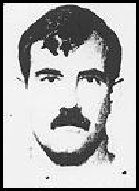 According to the mainstream media,
at about 2300 hrs on 11 September 1994, Frank Eugene Corder stole a single-engine
Cessna 150L plane from an airport north of Baltimore, then headed south
to Washington, flying over the National Zoological Park and down to the
Mall, probably using the Washington Monument as a beacon. As he neared
the famed obelisk, he banked a tight U-turn over the Ellipse, came in low
over the White House South Lawn, clipped a hedge, skidded across the green
lawn that girds the South Portico and crashed into a wall two stories below
the presidential bedroom. According to the mainstream media,
at about 2300 hrs on 11 September 1994, Frank Eugene Corder stole a single-engine
Cessna 150L plane from an airport north of Baltimore, then headed south
to Washington, flying over the National Zoological Park and down to the
Mall, probably using the Washington Monument as a beacon. As he neared
the famed obelisk, he banked a tight U-turn over the Ellipse, came in low
over the White House South Lawn, clipped a hedge, skidded across the green
lawn that girds the South Portico and crashed into a wall two stories below
the presidential bedroom.
Unfortunately, there are huge problems with this glib media account of
what was, in reality, the first known deliberate air attack on a major
building in America. Corder had no obvious motive for the crime, and although
his wife had died some weeks before from cancer, Frank was getting on with
life as best he could. He was building a small kit aircraft of his own
at the same airport the Cessna 150L was stolen from, and frequently worked
alone at night on his pet project, making him the perfect target of opportunity
for anyone needing a pilot, dead or alive.
Immediately after the crash, intelligence sources concurred that the flight
was most probably flown as a "Proof of Concept", designed to
thoroughly test Washingtonís air defenses and expose possible flaws.
If the Cessna 150L managed to strike the White House wall directly, the
concept would be considered proven, perhaps paving the way for later attacks
using heavier aircraft loaded with munitions. In this respect the flight
was a complete success.
Although Corderís badly mangled body was recovered from the wreckage,
there was no forensic way of establishing whether he had died in the crash
itself, or several hours earlier. No one witnessed Frank Corder board or
steal the Cessna in Maryland, and at no time did he make radio contact
with the control tower or anyone else. Frank Corder behaved in all respects
like a ghost, and he may well have been dead before the Cessna left the
ground in Maryland. How? By use of remote control.
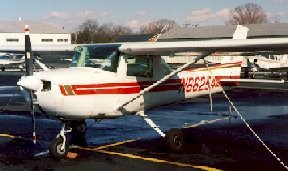 Remote controlled aircraft
have been around since the late fifties, and can be flown from the ground
with absolute precision. All that is needed is a reliable radio link to
the target aircraft, and if the target aircraft gets out of normal radio
range, a "shepherd" aircraft to act as a radio relay, or as airborne
flight director. It is now beyond reasonable doubt that the WTC attack
aircraft of 11 September 2001 were controlled in a similar manner, in this
case utilizing a counter-hijack system known as "Home Run". Those
not familiar with "Home Run" can read a comprehensive report
here, or use the link at the bottom of this page. Remote controlled aircraft
have been around since the late fifties, and can be flown from the ground
with absolute precision. All that is needed is a reliable radio link to
the target aircraft, and if the target aircraft gets out of normal radio
range, a "shepherd" aircraft to act as a radio relay, or as airborne
flight director. It is now beyond reasonable doubt that the WTC attack
aircraft of 11 September 2001 were controlled in a similar manner, in this
case utilizing a counter-hijack system known as "Home Run". Those
not familiar with "Home Run" can read a comprehensive report
here, or use the link at the bottom of this page.
Detailed technical information about aircraft remote control systems will
be provided later in this report, but before getting into the heavy stuff,
we should probably take a closer look at 15 year-old Charles Bishop. Bishop
is alleged to have stolen a Cessna 172R in Florida, and then "committed
suicide" by flying into the Bank of America building in downtown Tampa
on 5 January 2002. Unfortunately, just like Frank Corder in 1994, no one
witnessed Charles Bishop board or steal the Cessna in Florida, and at no
time during the flight did Bishop communicate with the control tower or
anyone else.
Spookily perhaps, there is at least one visual indicator that Bishop was
probably dead long before his aircraft hit the Bank of America. A Coastguard
helicopter patrolling in the local area actually flew alongside the Cessna
in an attempt to force the pilot to land, but without success. In the words
of the helicopter pilot: "He [Bishop] sat motionless at the controls.
He would not look at the helicopter, nor would he respond to radio or hand
signals telling him to land his aircraft".
-
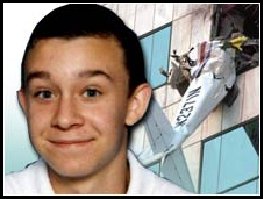 Think about it people,
think about it! If this excitable 15 year-old was on a glorious suicide
mission in support of his "idol" Osama Bin Laden, the temptation
to give the Coastguard helicopter crew the finger would have been damn
near irresistible. After all, what did he have to lose? On the other hand,
what if Bishopís aircraft had been hijacked by remote control without
his knowledge or consent? If he was still alive and saw himself being steered
unerringly towards the Bank of America, chances are he would have been
clawing desperately at the aircraft window, trying to get the Coastguard
to save him from imminent destruction. Think about it people,
think about it! If this excitable 15 year-old was on a glorious suicide
mission in support of his "idol" Osama Bin Laden, the temptation
to give the Coastguard helicopter crew the finger would have been damn
near irresistible. After all, what did he have to lose? On the other hand,
what if Bishopís aircraft had been hijacked by remote control without
his knowledge or consent? If he was still alive and saw himself being steered
unerringly towards the Bank of America, chances are he would have been
clawing desperately at the aircraft window, trying to get the Coastguard
to save him from imminent destruction.
"I would characterize it as a suicide," said Tampa Police Chief
Bennie Holder. A suicide note, which was found in the wreckage of the plane,
"clearly stated that he had acted alone, without any help from anyone
else," Holder said. "He did, however, make statements expressing
his sympathy for Osama bin Laden and the events which occurred September
11, 2001." News of the note police found stunned Bishop's fifth-period
algebra teacher, who described him as a bright, disciplined student who
was well-liked by his classmates. "I'm floored. Totally floored,"
said Rayette Bouldrick. "He always had a smile. He was always pleasant
and respectful."
The suicide note "clearly stated that he had acted alone"? Sure
it didÖ It is not hard to imagine a Kamikaze school kid thinking ahead
to the time when his local Police Chief will have to explain what happened,
and for political reasons will need to reassure the public that no one
else was involved. Absolute Bulldust! If Police Chief Bennie Holder is
incapable of recognizing deliberately planted evidence, he should quit
his job and go fishing.
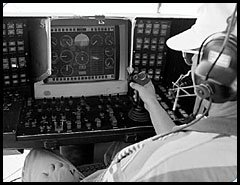 Many readers find the concept
of remotely controlled aircraft difficult to grasp, and in the past I have
received many emails critical of this aspect of my investigations. Accordingly
I decided to post precise details from various sources. It is a fascinating
subject little known to the public, and it all really began near a sleepy
little village in Wales during the fifties. Many readers find the concept
of remotely controlled aircraft difficult to grasp, and in the past I have
received many emails critical of this aspect of my investigations. Accordingly
I decided to post precise details from various sources. It is a fascinating
subject little known to the public, and it all really began near a sleepy
little village in Wales during the fifties.
Nestling beneath the stunning backdrop of the Snowdonia mountains on the
mid-Wales coastline is the Defence Evaluation and Research Agency (DERA)
station of Llanbedr, home to the most unusual collection of 'aircraft'
in the UK. It is here that DERA provide remotely piloted Drone 'aircraft'
for use as aerial targets by the RAF and other UK forces. Situated within
reach of the sand dunes of Cardigan Bay, the site is clearly visible from
the nearby tourist havens of Barmouth and Shell Island.
The airfield itself was constructed in 1939, however by 1950 Llanbedr had
been used by the Army for Korean War training, but was refurbished in order
to return it to aviation use by No.5 Civil Anti-Aircraft Co-operation Unit
with its Mosquito target tugs and Meteor TT8 aircraft. However it was intended
that an unmanned target aircraft should be used from Llanbedr, and plans
were laid to procure a RPV called 'Jindivik' from Australia. However development
delays led to a decision, taken in September 1951 to develop a number of
surplus Royal Navy Fairey Firefly aircraft as a target drones, to bridge
the inevitable gap.
The piston engined Firefly was a useful asset, but it was not long before
the drone programme was authorised to use jet powered ex-RAF Meteor F4's
and F8's, as they became available. In its drone guise the Meteor became
known as the U.15. The first take-off under automatic control took place
on 17 January 1955 with a human safety pilot on board. Llanbedr received
the first Meteor U.l5 in January 1957 and the first Meteor drone sortie
took place on l7 July 1958.
Telemetry as such was not available then, so a shepherd aircraft, usually
another Meteor would escort the drone to the entrance to the Range, hold
well clear and rejoin after the mission was concluded. As the Meteor F.8
became more available, surplus airframes were also converted into the more
sophisticated Meteor U.l6, which made its first drone flight in the September
of 1960, with over 200 of the type eventually being 'droned'. More details
on RAF Llanbedr:- LINK
Note carefully here, that although Llanbedr was nominally a Royal Air Force
military base, development and effective control of the remotely controlled
Fireflys and Meteors, lay in the hands of the civilian British Defence
Evaluation and Research Agency (DERA), which has close though discreet
ties with the civilian American Defense Advanced Research Projects Agency
(DARPA).
Back in the seventies it was DARPA and two American multinationals who
collaborated in order to manufacture the system now known as "Home
Run", a secret counter-hijacking system designed to recover hijacked
aircraft to a friendly airport with minimum damage to surviving passengers
and crew.
-
-
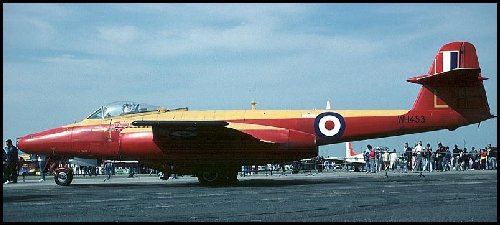
Similar systems used on the Meteors at Llanbedr were used on American aircraft,
which improved enormously as the years went by. Nowadays the most sophisticated
unmanned aircraft is probably the conversion of an F4 Phantom fighter to
"QF4", denoting full remote control capability. However, most
of QF-4s retain a piloted capability. This is because test and training
scenarios require a high degree of choreography to make them as realistic
as possible, and so pilots have to fly the QF-4s through "dry runs"
to ensure that all details are considered. The US Air Force refers to unpiloted
flights using the acronym NULLO ("Not Utilizing Local Live Operator"),
while the US Navy calls them NOLO ("No Onboard Live Operator").
Up to four QF-4s can be flown in formation during NULLO flights. The drones
do not interact with each other, they are simply commanded to follow a
specific moving point in space known as a "rabbit", with each
aircraft maintaining a specific three-dimensional offset from the rabbit.
The autopilot system on the QF-4 is very sophisticated. For example, the
remote operator can land the aircraft simply by giving it a single command
to land.
Although missiles used in air combat tests don't usually have combat warheads,
once a QF-4 is used as actual target in exercises, its expected lifetime
is no more than four missions. The QF-4 carries a self-destruct system
to destroy itself if missile damage fails to shoot it down but causes it
to become a potential threat. More details on the unmanned QF-4 here:-
<LINK>
-
-
- It does not take a rocket scientist to fit a basic remote
control (plus rabbit), to a humble little Cessna standing unguarded at
a remote civilian airfield. Once the pilot is on board ñ or placed
on board, the basic system will fly the aircraft wherever the controller
desires, including into the wall of the White House or the Bank of America
building. Basically all he or she needs to do is "lead" the aircraft
with the invisible rabbit, and the Cessna will follow as vigorously as
a greyhound at a race track.
The reason for the attack on the White House on 11 September 1994 is still
shrouded in mystery, but the logic of a "Proof of Concept" flight
is compelling. We can safely leave that incident alone for the present,
especially bearing in mind later events on 11 September 2001, which need
no further explanation here.
Not so obvious is the use of young Charles Bishop against the Bank of America
late on Saturday 5 January, so informed speculation will have to suffice.
At the subliminal television level, the two words "Bank" and
"America" certainly acted as powerful psychological reinforcers
on the global viewing public. Everyone knows that the World Trade Center
was Americaís premier "banking" zone, and everyone knows
"America" has been attacked by aircraft belonging to "American"
Airlines. Whether intentional or not, the effect of the Cessna crash in
Florida was to once again sensitize Americans and others to flying over,
or even near, America.
- Still on the subject of psychological reinforcers, it
cannot be denied that this particular crash served to highlight the utter
futility of grounding crop spray planes to prevent "terrorists"
from spreading "biological toxins". The simple reality here is
that Bishop's small plane, or any of the other tens of thousand like it,
could easily carry enough Anthrax spores to kill half the population of
Florida, or any other state, simply by crashing into a tall city building..
An alternative motive, perhaps compelling for the American Administration,
would be that of "reinforcing" the absolute fiction that a bunch
of "Arab Hijackers" with basic Cessna training, managed to control
three heavy jets moving at over 400 miles per hour, manipulate their descent,
and then hit three target bullseyes in Washington and New York so small
that success would tax the skills of highly experienced jet fighter pilots.
Vast numbers of American and others around the world are questioning the
involvement of Osama Bin Laden in the events of 11 September, even more
so now after the release of George W Bushís blatantly forged "Osama
Confession" video. Somehow this questioning must be stopped, and the
public forced to believe the increasingly wild myth about the hijackers.
What better way than to arrange for a 15 year-old boy with only six flying
hours to mount an attack on the Bank of America building in Florida? Think
about it. If 15 year-old Charles Bishop could score a direct hit on Bank
of America, then surely everyone must believe that the far more experienced
and older Mohammed Atta (or whoever), with ten flying hours on a 4,000#
Cessna, could obviously throw a 420,000# Boeing 767 airliner around New
Yorkís restricted airspace like a giant kiddy toy.
But the show must go on. Though Osama Bin Laden and Afghanistan had absolutely
nothing to do with the New York and Washington attacks, from the viewpoint
of certain American institutions it is vital that American operations in
Afghanistan be allowed to continue unhindered, to their final and extremely
profitable conclusion.
Put simply, the "War on Terror" in Afghanistan has nothing to
do with terror, and absolutely nothing to do with Unocal plans for an oil
pipeline running from the Caspian Sea, through Afghanistan, to a Pakistani
port. Though plans were once drawn up for just such a pipeline, estimated
infrastructure costs were so high that the project was permanently filed
in the wastebasket.
Afghanistan is all about the drugs trade, which provided nearly 80% of
the worlds #4 100% pure opium through American cartels and the CIA, until
the Taliban took control in 1996. For a while the Taliban stopped the trade
altogether, then started it again when the heroin was required as "trade"
for more weapons and ammo from China and Russia. The problem after 1996
was that Taliban heroin was no longer routed via the American cartels,
which lost tens of billions of dollars as a direct result.
The "War on Terror" was launched to get rid of the Taliban, and
their stranglehold on the heroin reserves rightfully "owned"
by the American cartels. That job is almost complete. As I write, all of
the CIAís old warlord "friends" have been restored to
power, and the Afghan poppy fields have already been sowed with the 2002
crop. So courtesy of a thoughtful American Administration, fresh supplies
of heroin for your children and their friends should be arriving in your
American town or city sometime soon.
Vialls Investigations:
http://geocities.com/vialls/index.html
http://software.design.tripod.com/mirror/whitehouse/9.htm
|